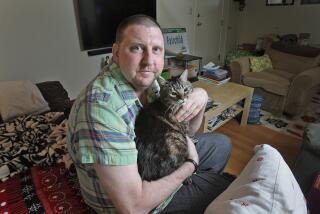Op-Ed: The Hippocratic oath and the terminally ill
- Share via
The Hippocratic oath, a roughly 2,000-year-old text with only marginal relevance to medicine today, continues to have an outsize influence on us.
The oath’s language and many of its concepts are more archaic than a washboard. A modern surgeon is not going to swear by Apollo. Nor is he going to teach “without reward” or pledge to comport himself “in a godly manner.”
Most of the Hippocratic oath has been revised over centuries. Today, it is most often cited as a single phrase, “First do no harm,” though those words were not contained in the oath as written by Hippocrates. The closest he gets: “With regard to healing the sick, I will devise and order for them the best diet, according to my judgment and means; and I will take care that they suffer no hurt or damage.”
But even if we accept the oath in its modern terminology, how do we define “harm”?
The history of medicine is littered with examples of doctors inadvertently doing harm. In the medical profession’s attempts to ward off morning sickness, for instance, doctors administered thalidomide to pregnant women, causing countless deformities among babies. So do we revise our oath to say, “Do no intentional harm?”
The question of what constitutes harm has come to the fore recently in a number of ways. Can doctors ethically be involved in executions? Should they offer advice with regard to torture?
And then there is the debate over euthanasia for terminal patients. Opponents say physicians can’t ethically be involved in ending patients’ lives because of their pledge not to do harm. As Hippocrates put it: “Nor shall any man’s entreaty prevail upon me to administer poison to anyone.” But proponents counter that doctors do harm by forcing terminally ill patients to endure pain and suffering when they would like to end their lives.
Let’s agree that by doing no intentional harm, we expect doctors to respect an individual’s desire to live. But what if that individual, like Brittany Maynard, has a terminal disease that doctors predict will result in a painful death? Which causes more harm: forcing the terminally ill to suffer and live or allowing them to die without pain?
Most Americans support the idea of allowing terminally ill patients to end their lives, according to two recent polls. And physician-assisted suicide is legal in several states.
As many doctors point out, since medicine has already discarded the vast majority of the Hippocratic oath, why adhere to the sentence about poisoning, which probably was aimed at reminding physicians not to allow themselves to be enlisted in murder plots?
“The deepest ethical principle restraining the physician’s power is not the autonomy or freedom of the patient; neither is it his own compassion or good intention,” wrote Dr. Leon Kass of the University of Chicago and author of the influential article “Neither for Love nor Money: Why Doctors Must Not Kill.” “Rather is it the dignity and mysterious power of human life itself, and therefore, also what the Oath calls the purity and holiness of life and art to which [the doctor] has sworn devotion.”
But perhaps we should set aside the debate over the oath and what it means. Should we allow our dedication to an ideal of “the purity and holiness of life” to outweigh an individual’s stated choice of forgoing pain and suffering? If we allow medicine to prolong life, should we also allow it to shorten life for the terminally ill?
We could, however, skirt the controversy entirely: What if we created another class of medical professionals known as death doulas, who could fill a gap between treatment doctors and hospice workers?
During childbirth, some women engage a doula to act as their advocate, ensuring that, as much as possible, the woman’s wishes are followed. Such a position could also be created to oversee the end of life for the terminally ill.
Most of us know how easy it is to lose one’s footing stepping in a hospital. Sometimes, it’s because of unforeseen medical events. Other times, it may be a disagreement on how to proceed in a complicated case. A death doula’s job would include ensuring, to the extent possible, that a patient’s stated desires are obeyed.
And if we are squeamish about doctors “violating” their ethics and prescribing lethal medication for the terminally ill who request it, we could shift this responsibility to licensed doulas, after physicians certify they can no longer help the patient.
In one recent study, 12% of doctors received one or more requests from patients asking about physician-assisted suicide; and an additional 4% received one or more requests for euthanasia. Another recent study put the numbers even higher: 57% of today’s doctors have received such requests.
Don’t we owe it to our doctors to provide guidance in such matters? Do we want each doctor to grapple with these decisions individually?
Clearly, we can no longer hide behind the flimsy shield of the Hippocratic oath. The drumbeat for change has begun. To pretend otherwise shows a lack of compassion and a disregard for not just for medicine but for the dignity of life.
Nora Zamichow is a Los Angeles journalist and former Times staff writer. Twitter: @zamichow. Dr. Ken Murray is a retired clinical assistant professor of family medicine at USC. He writes often on topics involving medical ethics.
Follow the Opinion section on Twitter @latimesopinion
More to Read
A cure for the common opinion
Get thought-provoking perspectives with our weekly newsletter.
You may occasionally receive promotional content from the Los Angeles Times.









